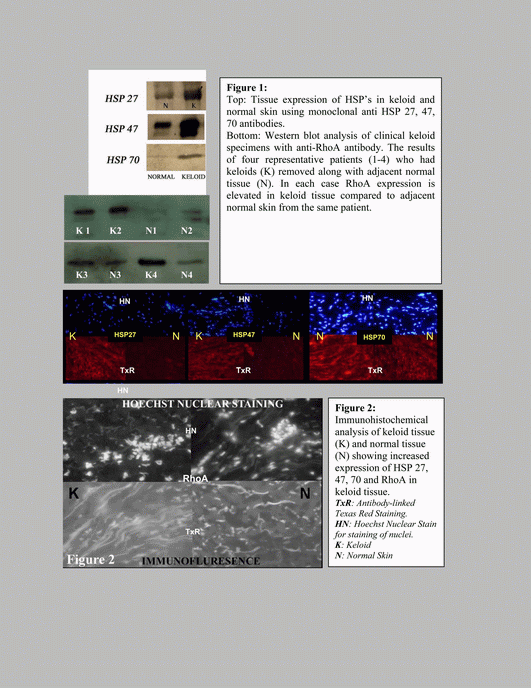McCormick Place, Lakeside Center
Sunday, September 25, 2005
9:00 AM - 5:00 PM
McCormick Place, Lakeside Center
Monday, September 26, 2005
9:00 AM - 5:00 PM
McCormick Place, Lakeside Center
Tuesday, September 27, 2005
9:00 AM - 5:00 PM
McCormick Place, Lakeside Center
Wednesday, September 28, 2005
9:00 AM - 5:00 PM
8673
Rho And Heat Shock Protein Pathways Are Upregulated in Keloid Formation
A keloid scar is the result of a hyperproliferative response of dermal tissue to trauma and is histologically characterized by an excess deposition of collagen. Rho kinases are effectors of the Rho-GTPase cell signaling pathway whose activity is regulated by small GTPases, the most ubiquitous being RhoA. This pathway is active in the wound healing process and has been implicated, for example, in the overzealous proliferative response of smooth muscle cells to endothelial injury that occurs in hypertension. Similarly, heat shock proteins (HSP) facilitate the synthetic response to tissue injury by acting as molecular chaperones during the synthesis of collagen (HSP 47) and other matrix elements (HSP 27, 47). This study was designed as a descriptive analysis of human keloid tissue with the purpose of comparing the expression of RhoA and HSP's in keloid and normal tissue. 32 keloid samples were removed along with adjacent normal skin tissue by elliptical excision from 24 patients who were between 16 and 45 years of age. Western blot analysis demonstrated significant over-expression of RhoA, HSP 27, 47, 70 in keloid tissue compared to normal skin (Fig 1). Immunohistochemistry studies supported the Western blot results (Fig 2). Morphometric analysis of the histology sections was also performed to quantify the differences, which were shown via t-test to be statistically significant (p<0.05). These results indicate that HSP's and Rho are upregulated in keloids and that they are involved in the molecular mechanism of keloid formation. How these pathways interact and whether or not these changes are causative of the hyperproliferative response that results in keloid formation remain to be determined. However, given that numerous inhibitors of the Rho pathway exist, these results point to the Rho pathway as a possible new target for keloid management.

View Synopsis (.doc format, 134.0 kb)
